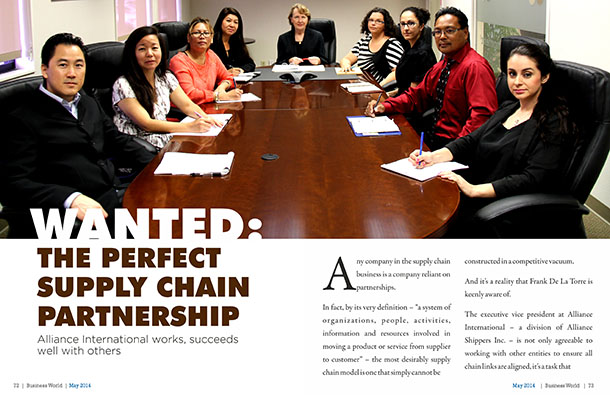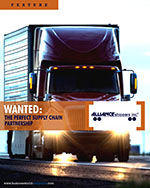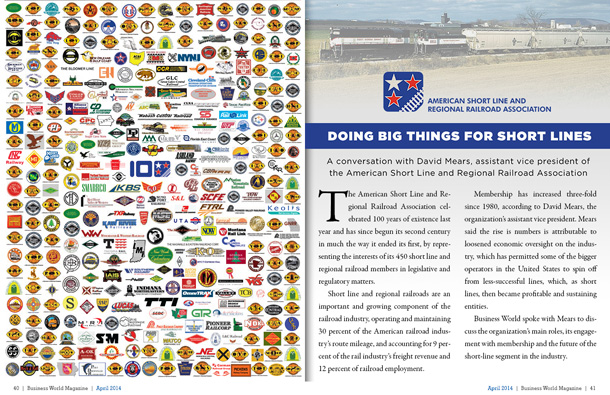
Wanted: The Perfect Supply Chain Partnership
Alliance International works, succeeds well with othersÂ

Any company in the supply chain business is a company reliant on partnerships.
In fact, by its very definition – “a system of organizations, people, activities, information and resources involved in moving a product or service from supplier to customer†– the most desirably supply chain model is one that simply cannot be constructed in a competitive vacuum.
And it’s a reality that Frank De La Torre is keenly aware of. The executive vice president at Alliance International – a division of Alliance Shippers Inc. – is not only agreeable to working with other entities to ensure all chain links are aligned, it’s a task that he labels as one of the most vital parts of his job – while creating a specific term for it, “partnershipping.â€
“Partnershipping, for us, is crucial. We’re very loyal,†he said. “We really want a partnership with our customer, because we want to give them the best and we can only do that when we are in partnership. We have very clear objectives and goals, and we lay all of our cards on the table.â€
“I can’t say enough about partnerships. The importance results in business performance and achieving outcomes beyond our expectations. Otherwise, everything is basically by the gun and holster.
“An important aspect of successful supply chain management is the reliability of members of the supply chain. Our partnerships with our customers are key to the service that we provide, and so ishaving a reliable partner that understands our goals and objectives, with whom we work closely with and that we’re loyal to.â€
De La Torre said the companies Alliance International works with are tracked on a partnership model that illustrates the service expectations in both directions – a time-consuming effort that ensures the right fit, whether it’s with a company that shares its U.S.-based home turf or one that’s headquartered across the globe in far-flung places within Europe, Asia and South America.
And the partners can be in varying industries as well – including ocean carriers, airlines and trucking companies whose locations can range from large metropolitan areas to remote rural outposts.
“It’s a relationship,†he said. “It’s a mindset and an understanding that there is an objective behind that partnership and that’s the only way we will grow.Typically, we negotiate and sign multi-year agreements with our vendors with specific clear terms and service requirements. Our first year focuses on achieving our client’s requirements and objectives, identifying non-compliances using a root-cause analysis tracing a problem to its origin. Before we get into our second year, we achieve a number of unexpected-cost saving results while improving visibility and reporting tools that enhance our client’s productivity and ours,thereby,keeping our overall cost down.
“Ideally, everybody becomes more productive and profitable. It’s almost like a positive virus. As business grows, all your supply chain representatives also grow as well. We definitely help grow some jobs by what we do and how well we do it.â€
The parent company, Alliance Shippers, was established in 1977 by a pair of owners who ran independent trucking services between Chicago and the northeast corridor – each based on opposite ends of that territory.
They created a 50/50 partnership and, thanks to a series of successes over 25 years, the company began branching out into other areas like warehousing/distribution, protective services, refrigerated services, intermodal, truck brokerage and international services – including customs and logistics.
The latter is the California-based De La Torre’s wheelhouse, though he concedes that the parent company’s brain trust – now headquartered in Englewood Cliffs, N.J. – wasn’t necessarily assuming such expansion would follow when they first got started 37 years ago, but ultimately saw the potential.
“All of these other services evolved as a result of the success,†he said.
“The owners themselves wanted to be able to provide several capabilities for accounts that they had developed in the prior 25 years. They had many Fortune 500 companies that were looking for solutions having to do with either refrigerated or international.â€
De La Torre joined the operation in 1988 and was tasked with developing the international arm and customs clearance functions. The entire company is home to approximately 600 employees, and he said it was the first in the industry to develop Internet-based tracking and tracing ability for shipments.
Clients these days include heavy hitters like the Masco Group, a Michigan-based operation comprised of more than 15 individual companies and about 32,500 employees, Bandag, a division of Bridgestone Tire, which is now headquartered in Nashville but whose roots trace back to include the Firestone Tire & Rubber Company that was created in Akron, Ohio in the earliest days of the 20th century, and Nestle Waters of North America, which imports multiple brands of water and beverage products from Europe and Canada to the U.S., including more than 18,000 container loads from Europe and more than 5,000 loads from Canada by truck.
“We provide an expertise having to do with governmental regulations that an importer or an exporter is confronted with,†De La Torre said. “That includes compliance issues and requirements of our government. An importer and an exporter and a customs house broker, which we are, is required to operate under certain rules and regulations outlined by U.S. Customs and Homeland Security.â€
Another Alliance asset is institutional experience in providing applications that allow importers to function in unique entry situations – whether it be temporary status, products for consumption in the U.S. or products brought into foreign trade zones within the U.S. – and the knowledge to know what options are the most efficient ones given a particular client’s individual situation.
Needless to say, it’s an overall function that got a bit more complex after Sept. 11, 2001.
For example, an Importer Security Filing is now required by Homeland Security 48 hours before a vessel is loaded that’s bound for the United States, and certain data has to be provided electronically to U.S. Customs at least 48 hours as well.
The advent of automated technology to accomplish many clerical tasks allows Alliance staff members to focus on those and other higher-end operational matters, and De La Torre said the staff-wide average is at least 10 years’ experience per person in transportation, logistics and compliance.
The know-how is both an everyday asset on the inside, and a selling point on the outside.
“I can’t say it’s unique, but I can say that not many organizations in our industry can make the same statement,†De La Torre said. “Our whole staff make-up is really one of experience. Today, systems are on the priority list;companies are looking atsystems management capabilities, as well as a company who is astute in government regulations and performance.â€
Seventy-nine percent of organizations with superior supply chain capabilities achieve revenue growth that is significantly above average. Alliance’s pivotal role helps their clients achieve this objective.
AT A GLANCE
WHO: Alliance International
WHAT:Global freight forwarder, NVOCC and U.S. Customs broker; division of Alliance Shippers Inc.
WHERE: Long Beach, Calif.
WEBSITE: www.Alliance.com








